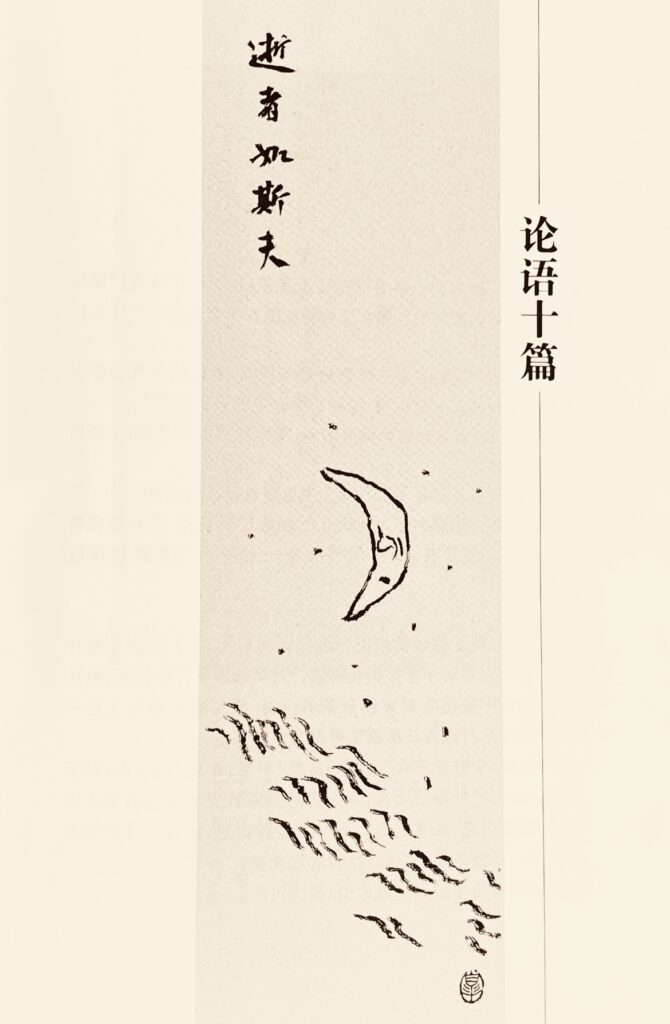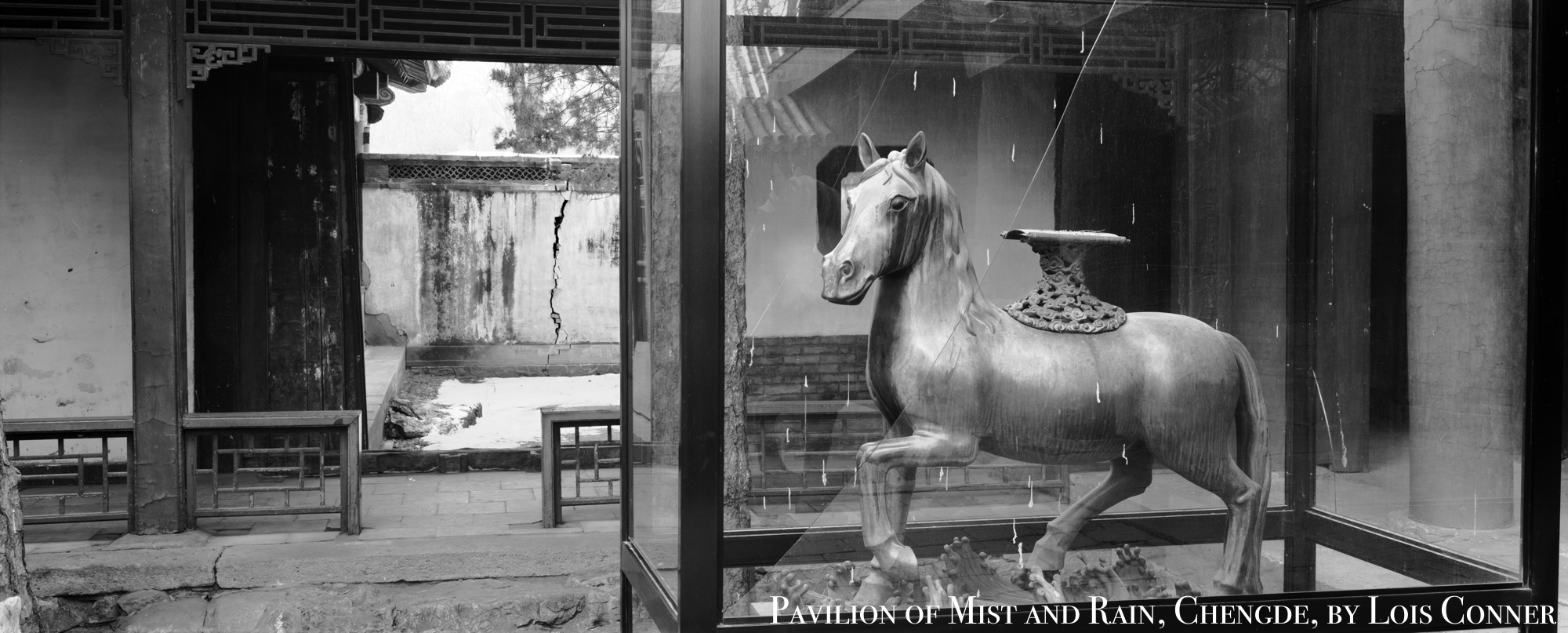The Tower of Reading
各言爾志
This is the first chapter in Studying Short Classical Chinese Texts by Zhong Shuhe 鐘叔河,《念樓學短·論語十篇·篇首》。The title of Zhong’s selection of ten excerpts from the Analects of Confucius is ‘Everything Flows Like This’ 逝者如斯夫, itself a line from the Analects, and the title of the second chapter.
***
Contents
(click on a section title to scroll down)
***
Preface
The Tower of Reading is a series published by China Heritage focussed on the work of Zhong Shuhe (鐘叔河, 1931-), one of the most influential editors and publishers in post-Mao China and a writer celebrated in his own right both as a prose stylist and as an interpreter of classical Chinese texts.
The full title of the series — ‘Studying Short Classical Chinese Texts with The Master of The Tower of Reading’ — is our translation of 念樓學短 niàn lóu xué duǎn, the enticingly lapidary name under which Zhong Shuhe published over five hundred newspaper columns over three decades (see 念樓學短2002年 and 念樓學短2020年).
Each selection features a short text of under 100 characters which Zhong translated into modern Chinese. To these Zhong appended ‘A Comment from the Master of the Tower of Reading’ 念樓曰 niàn lóu yuē, ‘casual essays’ — 小品文 xiǎopǐnwén or 雜文 záwén, modern terms for such works, akin to the traditional terms 筆記 bǐ jì, ‘jottings’ or 劄記 zhá jì, ‘miscellaneous literary notes’ — that expanded on the theme of the chosen text, or a particular historical figure or a particular incident.
For more on the background to this project, see Introducing The Tower of Reading.
***
The first section of Studying Short Classical Texts with The Master of the Tower of Reading consists of ten selections from the Analects of Confucius 論語. Here we introduce this material with an excerpt from Simon Leys’s introduction to his translation of the Analects, followed by the first chapter in Zhong Shuhe’s series, ‘Between Master & Student’ 師生之間. It is a suitable beginning for a project that allows the reader to study with The Master of the Tower of Reading.
Our thanks to Duncan Campbell for suggesting that we launch this selection of works by Zhong Shuhe with the Analects and also for his translation work. Duncan’s quiet enthusiasm for this undertaking have made it possible.
***
The gossamer-like connection woven here between the Analects, Zhong Shuhe and Simon Leys offers a fortuitous beginning to The Tower of Reading. Simon Leys (Pierre Ryckmans) was my mentor, Zhong Shuhe has been an inspiration for decades and the Analects of Confucius is a presence in the lives of all serious students both of the Chinese tradition and of modern China.
— Geremie R. Barmé
Editor, China Heritage
12 February 2024
***
Further Reading:
- 鍾叔河著, 《念樓學短》,兩冊,長沙:岳麓書社,2020年
- The Analects of Confucius, Translation and Notes by Simon Leys, New York: W.W. Norton, 1997
- The Analects, A Norton Critical Edition, ed. Michael Nylan, trans. Simon Leys, W.W. Norton, 2014
- Jiǎ Yǐ Bǐng Dīng 甲乙丙丁: Beginning Chinese with Pierre Ryckmans, The China Story, 30 November 2015
- One Decent Man, The New York Review of Books, 28 June 2018

***
The Analects
Simon Leys
Lu Xun (who is rightly considered as the greatest writer of modern China; he died in 1936, and —by the way—strongly disliked Confucius for reasons that will be briefly noted in a moment) observed that whenever a truly original genius appears in this world, people immediately endeavor to get rid of him. To this end, they have two methods. The first one is suppression: they isolate him, they starve him, they surround him with silence, they bury him alive. If this does not work, they adopt the second method (which is much more radical and dreadful): exaltation—they put him on a pedestal and they turn him into a god. (The irony, of course, is that Lu Xun himself was subjected to both treatments: when he was alive, the Communist commissars bullied him; once he was dead, they worshipped him as their holiest cultural icon—but this is another story.)
For more than two thousand years, Chinese emperors have set and promoted the official cult of Confucius. It became a sort of state religion. Now the emperors have gone (or have they?), but the cult seems very much alive still: as recently as October 1994, the Communist authorities in Peking sponsored a huge symposium to celebrate the 2545th anniversary of Confucius’s birth. The main guest speaker was the former prime minister of Singapore, Lee Kuan-yew. He was invited apparently because his hosts wished to learn from him the magic recipe (supposedly found in Confucius) for marrying authoritarian politics with capitalist prosperity.
Karl Marx once warned overenthusiastic followers that he was not a Marxist. With better reason, one should say that Confucius was certainly not a Confucianist. Imperial Confucianism only extolled those statements from the Master that prescribed submission to the established authorities, whereas more essential notions were conveniently ignored—such as the precepts of social justice, political dissent, and the moral duty for intellectuals to criticize the ruler (even at the risk of their lives) when he was abusing his power, or when he oppressed the people.
As a result of these ideological manipulations, in modern times many enlightened and progressive-minded Chinese came spontaneously to associate the very name of Confucius with feudal tyranny; his doctrines became synonymous with obscurantism and oppression. All the great revolutionary movements in twentieth-century China were staunchly anti-Confucian and it is easy enough to sympathize with them. Actually—if I may invoke here a personal experience I still remember the dismay expressed by various Chinese friends on learning that I was translating the Analects of Confucius: they wondered how I could suddenly sink into that sort of intellectual and political regression.
I certainly feel no need to justify the orientation taken by my work. Yet such a justification would be all too easy to provide for an obvious reason: no book in the entire history of the world has exerted, over a longer period of time, a greater influence on a larger number of people than this slim little volume. With its affirmation of humanist ethics and of the universal brotherhood of man, it inspired all the nations of Eastern Asia and became the spiritual cornerstone of the most populous and oldest living civilization on earth. If we do not read this book, if we do not appreciate how it was understood through the ages (and also how it was misunderstood)—how it was used (and how it was misused) in one word, if we ignore this book, we are missing the single most important key that can give us access to the Chinese world. And whoever remains ignorant of this civilization, in the end can only reach a limited understanding of the human experience.
This consideration alone would more than justify our interest in Confucius, even if he should have been every bit as distasteful a character as so many leading Chinese intellectuals came to portray him earlier in this century. Whether he was such is not for me to say. Confucius can speak for himself—and the marvelous fact is precisely that, across twenty-five centuries, it seems at times that he is directly addressing the very problems of our age and of our society.
But this modernity of Confucius is an aspect which, paradoxically, non-Chinese readers may perhaps be in a better position to appreciate. The only advantage that can be derived from our condition of ignorant foreigners is precisely the possibility to look with a kind of unbiased innocence at this book—as if it were all fresh and new. Such innocence is denied to native readers. For them, the Analects is the classic par excellence.
— from the Introduction to The Analects of Confucius, Translation and Notes by
Simon Leys, New York: W.W. Norton, 1997 p.xv-xvii
Master & Student
師生之間
Yan Hui and Zilu were in attendance. The Master said: “How about telling me your private wishes?”
Zilu said: “I wish I could share my carriages, horses, clothes, and furs with my friends without being upset when they damage them.”
Yan Hui said: “I wish I would never boast of my good qualities or call attention to my good deeds.”
Zilu said: “May we ask what are our Master’s private wishes?”
The Master said: “I wish the old may enjoy peace, friends may enjoy trust, and the young may enjoy affection.”
— Simon Leys, Analects, 5.26, pp.23
各言爾志
顏淵、季路侍,子曰:盍各言爾志。子路曰:願車馬、衣輕裘與朋友共,敝之而無憾。顏淵曰:願無伐善,無施勞。子路曰:願聞子之志。子曰:老者安之,朋友信之,少者懷之。
—《論語·公冶長·26》
***
A Comment from The Tower of Reading:
The reason why the House of Confucianism became a particular target for attack in the early twentieth century was simply because, prior to that, Confucius had been officially enthroned as the Great Teacher. The state required the Chinese to worship at the feet of this idol. In reality, Confucius is somewhat akin to Socrates and Plato. If he hadn’t been turned into the Ultimate Sage, the be-all and end-all of tradition, he could well have enjoyed a more appropriate place in the history of Chinese thought. If that had happened, at the very least they wouldn’t have felt the need to dig up his corpse and burn it to a cinder.
My favourite passage in the Analects is one in which The Master, sitting with his disciples Zilu, Zeng Dian, Ran Qiu and Gongxi Chi, asks each of them in turn about their ambitions. Zeng Dian replies that he would ‘Like to bathe in the River Yi, and then enjoy the breeze on the Rain Dance Terrace, and go home singing.’ This is expressed in such a moving way. For master and student, educator and educated, to sit together as equals as they engage in conversation, ‘simply confiding their personal aspirations’, is a circumstance that is difficult to conjure up even today. It is a pity that that passage is a little too long for my present purposes. Instead, I have chosen the one above.
As a teacher, Confucius never bragged or boasted. This was his most enduring quality.
— Zhong Shuhe, translated by Duncan Campbell
***
Source:
- Chapter One in Section One of Studying Short Classical Chinese Texts with The Master of The Tower of Reading 《念樓學短》,上冊,pp.2-3.
Sitting with The Master
The following is Zhong Shuhe’s ‘favourite passage’ in the Analects, mentioned above. The translation is, again, by Simon Leys and it is followed by the original Chinese text and an explanatory note, also by Leys.
— Ed.
Zilu, Zeng Dian, Ran Qiu, and Gongxi Chi were sitting with the Master. The Master said:
“Forget for one moment that I am your elder. You often say: ‘The world does not recognize our merits.’ But, given the opportunity, what would you wish to do?”
Zilu rushed to reply first: “Give me a country not too small, but squeezed between powerful neighbors; it is under attack and in the grip of a famine. Put me in charge: within three years, I would revive the spirits of the people and set them back on their feet.”
The Master smiled. “Ran Qiu, what about you?”
The other replied: “Give me a domain of sixty to seventy—or, say, fifty to sixty leagues; within three years I would secure the prosperity of its people. As regards their spiritual well-being, however, this would naturally have to wait for the intervention of a true gentleman.”
“Gongxi Chi, what about you?”
“I don’t say that I would be able to do this, but I would like to learn: in the ceremonies of the Ancestral Temple, such as a diplomatic conference for instance, wearing chasuble and cap, I would like to play the part of a junior assistant.”
“And what about you, Zeng Dian?”
Zeng Dian, who had been softly playing his zithern, plucked one last chord and pushed his instrument aside. He replied: “I am afraid my wish is not up to those of my three companions.” The Master said: “There is no harm in that! After all, each is simply confiding his personal aspirations.”
“In late spring, after the making of the spring clothes has been completed, together with five or six companions and six or seven boys, I would like to bathe in the River Yi, and then enjoy the breeze on the Rain Dance Terrace, and go home singing.” The Master heaved a deep sigh and said: “I am with Dian!”
The three others left; Zeng Dian remained behind and said:
“What did you think of their wishes? The Master said. “Each simply confided his personal aspirations.”
“Why did you smile at Zilu?”
“One should govern a state through ritual restraint; yet his words were full of swagger.”
“As for Ran Qiu, wasn’t he in fact talking about a full-fledged state?”
“Indeed; have you ever heard of ‘a domain of sixty to seventy, or fifty to sixty leagues?”
“And Gongxi Chi? Wasn’t he also talking about a state?”
“A diplomatic conference in the Ancestral Temple! What could it be, if not an international gathering? And if Gongxi Chi were there merely to play the part of a junior assistant, who would qualify for the main role?”
— Simon Leys, Analects, 11.26, pp.53-54
公西華侍坐
子路、曾皙、冉有、公西華侍坐。子曰:以吾一日長乎爾,毋吾以也。居則曰:不吾知也。如或知爾,則何以哉。子路率爾而對曰:千乘之國,攝乎大國之間,加之以師旅,因之以饑饉;由也為之,比及三年,可使有勇,且知方也。夫子哂之。求,爾何如。對曰:方六七十,如五六十,求也為之,比及三年,可使足民。如其禮樂,以俟君子。赤,爾何如。對曰:非曰能之,願學焉。宗廟之事,如會同,端章甫,願為小相焉。點,爾何如。鼓瑟希,鏗爾,舍瑟而作。對曰:異乎三子者之撰。子曰:何傷乎。亦各言其志也。曰:莫春者,春服既成。冠者五六人,童子六七人,浴乎沂,風乎舞雩,詠而歸。夫子喟然歎曰:吾與點也。三子者出,曾皙後。曾皙曰:夫三子者之言何如。子曰:亦各言其志也已矣。曰:夫子何哂由也。曰:為國以禮,其言不讓,是故哂之。唯求則非邦也與。安見方六七十如五六十而非邦也者。唯赤則非邦也與。宗廟會同,非諸侯而何。赤也為之小,孰能為之大。
— 公西華侍坐,《論語·先進·26》
A Note on ‘Sitting with The Master’
Simon Leys
Analects 11.26:
Zilu, Zeng Dian, Ran Qiu and Gongxi Chi were sitting with the Master …: the beauty of this long section need not be underlined here—it should be self-evident. Still, it may be useful to add two observations, one on the style, and one on the content of this passage.
Within the Analects, the format of this sustained narrative, with dialogues, characters, and subtle psychological hints is quite exceptional; the language itself appears to pertain to a period slightly later than the rest of the book. In the history of Chinese literature, this is the earliest example of what was to become, after many centuries, one of the most exquisite literary genres, the short lyrical prose essay.
A superficial acquaintance with the Analects has led too many readers to see Confucius as an activist exclusively absorbed by the tasks and responsibilities of public life. We have already had several occasions to challenge such a narrow view, and to point out the strong mystical side which Confucius manifested repeatedly. This aspect of the inner, private Confucius is fully displayed here, in the context of an intimate and informal conversation; in his unexpected support for Zeng Dian’s choice, he reveals himself as a man for whom contemplation takes precedence over all other values. It is no wonder that, in Song and Ming times, neo-Confucian thinkers under the influence of Chan Buddhism (“Zen”)—which they were trying to integrate into Confucianism—attached particular importance to this passage.
— Simon Leys, Analects, pp.173-174
Original Chinese Text
學其短:The selected Classical Chinese text, with notes;
念樓讀:Zhong Shuhe’s translation into Modern Chinese; and,
念樓曰:Zhong Shuhe’s comment.
師生之間
各言爾志 《論語》
顏淵、季路侍,子曰:盍各言爾志。子路曰:願車馬、衣輕裘與朋友共,敝之而無憾。顏淵曰:願無伐善,無施勞。子路曰:願聞子之志。子曰:老者安之,朋友信之,少者懷之。
【學其短】
- 本文錄自《論語·公冶長》。《論語》是孔子的語錄,共二十篇,每篇分為若干章(本書統一稱篇)。
- 孔子,春秋時魯國陬邑(今山東曲阜東南)人,名丘,字仲尼。
- 顏淵名回,季路(子路)姓仲名由,都是孔子的學生。
- 「車馬衣裘」,「裘」字前諸本均有「輕」字,阮元、錢大昕認為是後人錯加的,從刪。」
【念樓讀】顏淵和子路陪侍在孔子身旁,孔子對他倆道:「隨便談談各人的志願好嗎?願意怎樣地生活?願意成為一個什麼樣的人?」
子路道:「我願意真心慷慨地對待朋友,自己的車馬和好衣裳都拿來和朋友一起用,用壞了穿舊了也不在乎。」
顏淵道:「我願意做個謙遜的人,不誇耀自己的優點,不張揚自己的成績。」
子路反過來對孔子道:「請先生也談談自己的志願。」
孔子道:「惟願老年人和我在一起能過得安詳,朋友們和我在一起能互相信任,少年人和我在一起以後還能想起這段時光。」
【念樓曰】孔子曾經被法定為最偉大的導師,是官方明令崇拜的偶像,所以後來才要打倒孔家店。其實他本是蘇格拉底、柏拉圖一流,若不被包裝成大成至聖的金身,原可在思想史上佔一席,不至於死屍還要從墳墓里被拖出來燒灰。
《論語》中我最喜歡「公西華侍坐」一章,不但「浴乎沂,風乎舞雩,詠而歸」的描寫動人,師生之間亦即教育者和被教育者之間,提倡自由地「各言爾志」,平等地進行討論,此在今日亦屬不可多得。可惜的是它篇幅較長,故取此章。
孔子身為導師而不說大話,最為可取。
***
Source:
- 鍾叔河著, 《念樓學短》,上冊,長沙:岳麓書社,2020年,第2-3頁。
***


